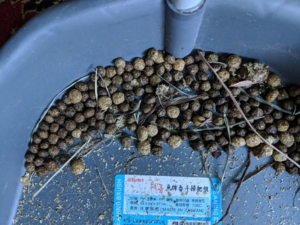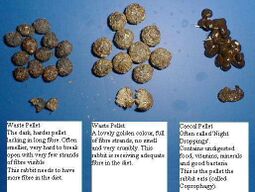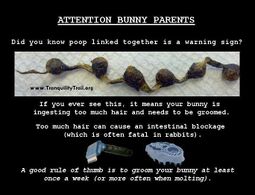Rabbit poop
Rabbit owners will generally become very familiar with rabbit poop and droppings in their course of bunny ownership. All rabbits form two types of droppings: round dry fecal pellets (referred to in this article) and wet smelly cecotropes that are usually unseen by owners as rabbits normally eat them directly as they are produced.
Changes in poop
Generally, large golden poops are a great sign of fiber health in rabbits, but a slight variation in darker size is also normal depending on the protein content in the diet. Rabbits will generally make larger golden poops on a primary hay like oat or timothy but smaller darker poops on a slightly higher protein hay like orchard grass. Both are normal, and there is no need to restrict pellets or vegetables in the diet in an attempt to chase the ideal poop color and size.
It is important that your rabbit does not end up underweight and malnourished from too much fiber in the diet over a long period of time.
If you see small poops and uneaten cecals or some mucus on the floor, please observe your rabbit for any changes in behavior and make sure that the negative changes are just one-offs. If they occur more often, please see your veterinarian for a checkup as it can be an early sign of more serious health issues.
Problems with poop
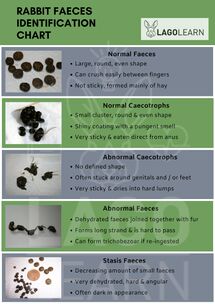

Analyzing your rabbit's fecal pellets is a good way of diagnosing whether all is right with your rabbit's health. If they are repeatedly malformed or abnormal, it is usually indicative of some health problem that needs immediate attention.
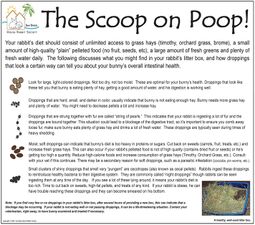
| Syndrome | Incidence in pet rabbits | Hard feces | Cecals | Condition of rabbit | Causes |
|---|---|---|---|---|---|
| Uneaten normal cecals | Common | Copious quantities | Normal consistency | Good appetite |
|
| Uneaten soft cecals | Common | Copious quantities | Soft, liquid consistency | Well |
|
| Coccidiosis |
|
Diarrhea can range from haemorrhagic liquid feces to bulky soft feces | Indistinguishable from hard feces | Depends on severity of condition | Eimeria spp. |
| Mucoid enteropathy |
|
|
Abnormal soft cecals may be intermittently interspersed with mucus and diarrhea |
|
|
| Cecal impaction | Sporadic incidence |
|
None in later stages | May pick at food in early stages |
|
| Enteritis |
|
|
Not seen |
| |
| Enterotoxaemia |
|
|
Not seen |
|
|
| Chronic inflammatory disease | Rare and only in adults | Large amounts of bulky soft feces | Indistinguishable from hard feces |
|
|
| From Varga, M. (2013). Textbook of rabbit medicine. (2nd ed.). | |||||
Poopy butt
Poopy butt is the informal term of what happens when rabbits get runny stool or are unable to reach and clean their back end. It can also be referred to as intermittent soft stools, ISS, or sticky bottom syndrome. See Cecotropes for more information, as poopy butt is often caused by unformed cecals.
To clean a poopy butt, please see the Bathing article. It is important to keep the perineal area clean as the anus can be blocked by dried cecals.[1] It is also especially important in warmer months as dirty bottoms can increase the likelihood of flystrike.
Below are links with more information about poopy butt in rabbits.
- Susan Brown, DVM. (2009). Intermittent Soft Cecotropes in Rabbits
- Dana Krempels, Ph.D. The Mystery of Rabbit Poop
- Rabbit Welfare Association and Fund. Rabbit Dirty or Sticky Bottoms
- Vetlexicon. Sticky bottom syndrome
Diarrhea
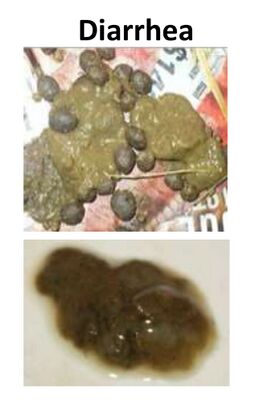
True diarrhea or diarrhoea is a medical emergency and is diagnosed when there are absolutely no normal stools produced -- neither hard feces nor cecotrophs. The diarrhea may appear watery or contain blood or mucous. A rabbit with true diarrhea should be taken to a rabbit-savvy veterinarian immediately.
The primary prevention of diarrhea is by properly introducing changes in diet slowly and providing diets that are adequate in both indigestible and soluble fiber.[1]
Young rabbits are at most at risk of contracting diarrhea due to changes in both digestive tracts and diet after weaning.
Common diarrheal diseases of rabbits include coccidiosis, colibacillosis, and enterotoxemia.
In rare cases, chronic diarrhea can be caused by genetic issues such as megacolon and dietary intolerance to food, including gluten.

The following links have more information on diarrhea.
- Dana Krempels, Ph.D., Emergency protocol for diarrhea in infant and juvenile rabbits, cottontails and hares
Some experiences with chronic diarrhea:
- The Rabbit Doctors. (2021). Diarrhea in 11 rabbits improved by removing all sources of gluten in the diet (hay, treats, and pellets)
Eating fecal pellets
See the links below for more information on rabbits eating their dry fecal pellets (not their cecals).
Composting rabbit waste
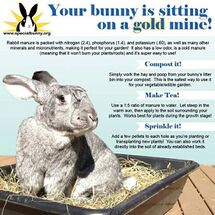
Rabbit litter is a great fertilizer for your garden. The manure contains higher levels of nitrogen and phosphorous compared to steer, sheep, chicken, and horse manures. Rabbit droppings can be added directly to the soil without burning by sprinkling it on top or scratching it into the dirt. You can also make manure tea for garden plants by adding a quart of water to about a cup of droppings in a bucket and letting it steep for a few days.[2]:155
If you use a rabbit-safe litter, you can compost all the hay, fur, wooden toys, urine, droppings, and litter together.
Below are links with more information about composting your rabbit litter for use in your garden.
- The Rabbit House. (2013). Composting Rabbit Droppings
- Dixie Sandborn. (2016). Bunny honey: Using rabbit manure as a fertilizer
- Christine Bennett. (2003). The Magic Bunny Poo: A Composting Tale
- Chris McLaughlin. Rabbit Manure in the Garden
- Calico Rabbit. (2009). Composting with rabbits!
- Nikki Tilley. (2019). Making And Using Rabbit Manure Compost
The following information are from rabbit breeder websites. Please remember that we do not condone rabbit breeding for the common house rabbit owner and that these links are purely for reference information.
- Rise and Shine Rabbitry. (2012). The Benefits and Uses of Rabbit Manure
- Kazuko "Kay" Smith. (2001). Raising Worms With Rabbits
Further reading
- Kinenchen, Bunny Poops
- Save a Fluff, Why keeping an eye on your rabbit's poo is important!
- bunnymama.com, Rabbit Poop 101
- The Straight Dope, Why do some animals have pellet poop?
- Dana Krempels, Ph.D., The Mystery of Rabbit Poop
See also
References
- ↑ 1.0 1.1 Moore, L. (2013). Rabbit nutrition and nutritional healing. (2nd ed.).
- ↑ Moore, L. (2017). Rabbit nutrition and nutritional healing. (3rd ed.).


